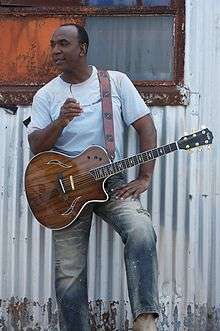Thomas McClary (musician)
| Thomas McClary | |
|---|---|
 Thomas McClary, Co-Founder of The Commodores | |
| Background information | |
| Born |
October 6, 1949 Eustis, Florida, United States |
| Genres | Soul, R&B, Funk, Gospel |
| Occupation(s) |
Guitarist Songwriter Singer Record producer |
| Instruments | Acoustic Guitar, Electric Guitar, Ukulele, Vocals |
| Years active | 1968–present |
| Labels | Motown Records |
| Associated acts | The Commodores |
| Website | http://www.thomasmcclary.com/ |
Thomas McClary (born October 6, 1949) is an American guitarist, singer, songwriter, and record producer best known as the co-founder and lead guitarist of The Commodores.
Early life
McClary was born in Eustis, Florida, in 1949. He became one of the first African-American students to integrate the Florida school system prior to the enforcement of Brown v. Board of Education. McClary began playing music at a very early age, starting with the ukulele and then adding the acoustic guitar and later the electric guitar to his repertoire. After graduation, McClary went to college at Tuskegee University in Alabama where he majored in business.[1]
Career
As a student at Tuskegee, McClary met Lionel Richie in the registration line. The two became friends and in 1968 they began to put together a band which they called The Mystics. McClary played the lead guitar and, early on, shared in the lead vocals. The group played local gigs then added more members and changed their name to the Commodores. In 1972, McClary and the Commodores signed with Berry Gordy and Motown Records.[2]
McClary spent 15 years as the lead guitarist for the Commodores while also participating in songwriting, producing, and lead-vocal duties. His guitar solo in the Commodores song "Easy" has been hailed as one of the best solo guitar performances of all time.[1] While with the Commodores, McClary wrote two songs by himself, including "Cebu" and "Sexy Lady" (the latter he sings lead vocals on) and collaborated with Lionel Richie to write many more, including "Flying High", "Come Inside", "High On Sunshine", "Girl, I Think the World About You", "Midnight Magic", "12:01 A.M.", "Got To Be Together", "Wake Up Children", "Funny Feelings", "Heaven Knows", "Won't You Come Dance With Me", "Visions", "Hold On", and "Free".
Among the many songs McClary co-wrote with the Commodores as a group are, "Brick House", "Slippery When Wet", "I Feel Sanctified", "Too Hot ta Trot", "Ooo Woman You" (with Melissa Manchester, in which he also sang lead vocal)", "Welcome Home (with Bill Champlin), "You Don't Know That I Know", "Let's Get Started", "Time", "Captured", "Celebrate" (with Larry Davis and Harold Hudson), "Saturday Night" and "Keep On Taking Me Higher" (with Harold Hudson).[1]
McClary's musical influence then moved outside of just The Commodores. From the "Endless Love" soundtrack, he co-wrote (with Lionel Richie) "Dreaming of You" which was performed by Richie and Diana Ross as well as Kenny Rogers' "Without You In My Life". Another was the track "Steam Room" off of "Jayne Kennedy's" "Complete Exercise Program". McClary co-wrote and produced multiple songs for the 1980s pop group "Klique's" album "Try It Out" (one of which was "Stop Dogging Me Around" which became the #1 song on the Black Contemporary Charts")[3] and "Love Circles". McClary also co-wrote and produced four songs for bassist "Michael Henderson's" popular "Fickel" album.
After leaving the Commodores in 1984, McClary signed a solo contract with Motown and the following year released a solo album titled, Thomas McClary, which featured the popular single "Thin Walls" that climbed to #57 on the "Billboard R&B chart".[2]
In 1986 McClary returned to Florida and turned to his Christian roots by becoming the music director of his church and forming a gospel music record label[4] under which he released the 2008 album titled A Revolution Not a Revival. In 2014 McClary began recording and performing with the newly structured band called The Commodores featuring Thomas McClary.
Solo discography
- 1984 - Thomas McClary (Motown)
- 2008 - A Revolution Not a Revival (CDBY)
Filmography
- 1977 - Scott Joplin (w/The Commodores)
- 1977 - Looking for Mr. Goodbar (w/The Commodores)
- 1977 - James at 16 (w/The Commodores)
- 1978 - Thank God It's Friday (w/The Commodores)
- 1982 - The Last American Virgin (w/The Commodores)
- 1986 - One More Saturday Night (songwriter)
See also
References
- 1 2 3 Thompson, Dave. "Funk". Backbeat Books. 2001. Page 110 – 114. ISBN 0-87930-629-7.
- 1 2 Ivory, Steve. "McClary Exits Commodores for Solo Career". Billboard Magazine. Nov. 3, 1984. Vol. 96, #44. Pp.72-73. Retrieved 18 January 2013.
- ↑ Bronson, Fred. The Billboard Book of Number One Hits: Updated and Expanded 5th Edition. Pg. 487. Billboard Books. 2003. ISBN ISBN 0-82307-641-5.
- ↑ Diaz, George. Orlando Sentinel. "Son of Eustis Comes Home for His Soul and Others'". Jan. 7, 2007. Retrieved 18 January 2013.
External links
| ||||||||||||||||||||||